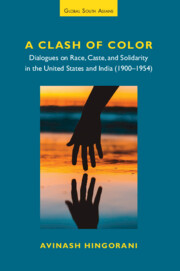 A Clash of Color
A Clash of Color Published online by Cambridge University Press: 28 November 2024
The marginalization of Black Americans due to White supremacy and the oppression of Indians under British colonialism featured inescapable similarities. At the turn of the twentieth century, these parallels led Indian and Black nationalists, intellectuals, and activists to share their experiences and engage in dialogues toward improving the social status of their people. Specifically, Black internationalists such as W. E. B. Du Bois, Walter White, and Paul Robeson studied the Indian independence movement and came to regard India as a template in the fight against White supremacy in the United States (US). Ultimately, they came together in their desire to overthrow the structures that subjugated them. Throughout the late nineteenth and early twentieth centuries, some Indians and Americans exchanged ideas about race, caste, and class, creating lasting cultural connections.
In this book, I explore the foundational cultural and political connections between India and the US between the late nineteenth and mid-twentieth centuries by focusing on a small select group of Indians and Americans and their ideas on race, caste, and class. Several key figures of the time, on both sides, attempted to assess whether the Black experience in the US mirrored caste, colonialism, or racial discrimination in India. Both Indians and Americans studied race, caste, and class dynamics outside their own countries in order to learn what they could apply to their own struggles. This study spans from the start of the twentieth century when W. E. B. Du Bois notably declared at the first Pan African Conference in 1900 that “the problem of the twentieth century is the problem of the color line” until the immediate aftermath of the 1954 Brown v. Board of Education Supreme Court case, in which the US Supreme Court ruled that racial segregation in public schools was unconstitutional.
In a June 2021 seminar, historian Dwaipayan Sen noted that although alliances between oppressed groups are interesting and worthy of discussion, he queried whether any meaningful social change can be accomplished by race and caste solidarities between Americans and Indians. Sen argued that since Black American and Dalit struggles are local issues that exist within separate nation states, it is doubtful that that Black and Dalit alliances possess a transnational impact.
To save this book to your Kindle, first ensure [email protected] is added to your Approved Personal Document E-mail List under your Personal Document Settings on the Manage Your Content and Devices page of your Amazon account. Then enter the ‘name’ part of your Kindle email address below. Find out more about saving to your Kindle.
Note you can select to save to either the @free.kindle.com or @kindle.com variations. ‘@free.kindle.com’ emails are free but can only be saved to your device when it is connected to wi-fi. ‘@kindle.com’ emails can be delivered even when you are not connected to wi-fi, but note that service fees apply.
Find out more about the Kindle Personal Document Service.
To save content items to your account, please confirm that you agree to abide by our usage policies. If this is the first time you use this feature, you will be asked to authorise Cambridge Core to connect with your account. Find out more about saving content to Dropbox.
To save content items to your account, please confirm that you agree to abide by our usage policies. If this is the first time you use this feature, you will be asked to authorise Cambridge Core to connect with your account. Find out more about saving content to Google Drive.